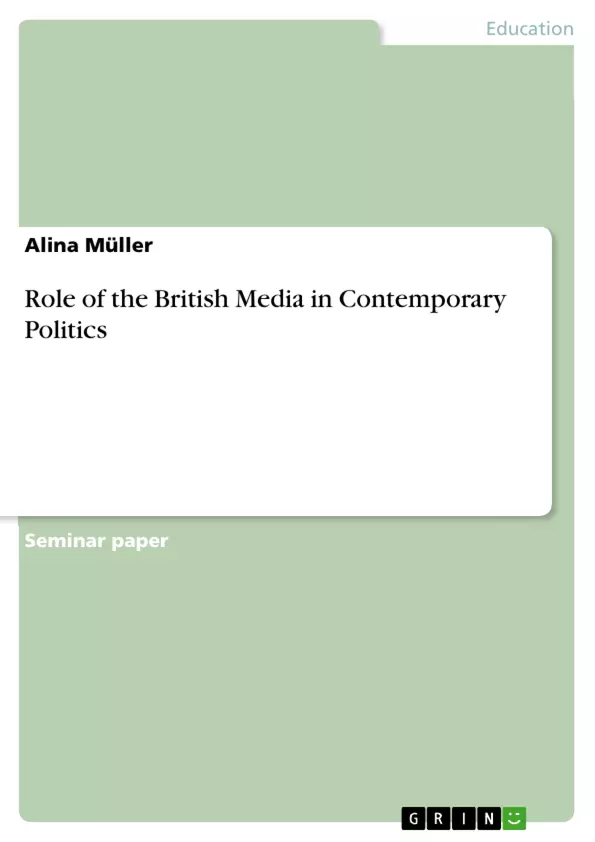This essay will show that the British media institutions do not always follow those concepts and they work differently in practice. It confirms that Marxist theories which incline to the presence of ideological views in the media agenda still have influence in a democracy nowadays.
The first part of this essays deals with the role of the media as a provider of political knowledge. The mass media play an important role in the formation of public views, because of being a basic institution that provides the communication between politicians and the public. But the misrepresentation of politics through the media shapes negative views on politics and makes people doubtful towards political system. The second part of this essay is concerned with the media as an implementer of governmental directives. The media institutions often undergo the influences of the political economy and governments, and the media output is to some extent formed under their impact. The broadcasters distributing State propaganda and tricking the public serve the government. Although there are institutions aiming to protect the media content against the external impact, the governments and depositors still have access to the broadcasting and press. The third part of the essay deals with the media as an agent of majority of views. But despite of the representation of plurality of views, the media agenda is unable to develop political debate among the citizens. Although the public receive sufficient information about different sides of political life, the interest in traditional politics is declining and the political debate as well. In other words, despite of being a great provider of political knowledge, introducing a plurality of views and being controlled by a watchdog, the British media do not fulfil the major key points of the liberal media theory.
Inhaltsverzeichnis (Table of Contents)
- Introduction
- Media as a Transmitter of Political Information Shaping Public Views
- Media as an Implementer of Governmental and Other Interest Groups Directives
- Influence and Delusion of Public by the Media
- Making Use of the Media for Own Purposes
- Media and the Declining Political Debate
- Conclusion
Zielsetzung und Themenschwerpunkte (Objectives and Key Themes)
This essay examines the role of the British media in contemporary politics and analyzes whether the media fulfills the key principles of liberal media theory. The essay explores the media's function as a provider of political information, its relationship with government and interest groups, and its impact on political discourse. It argues that the British media, while offering some benefits, falls short of the ideal outlined by liberal media theorists.
- The role of media in shaping public views and attitudes towards politics
- The influence of political economy and government on media content
- The media's ability to promote a plurality of views and foster political debate
- The impact of media on political participation and trust in the political system
- The role of the media as a watchdog in a democratic society
Zusammenfassung der Kapitel (Chapter Summaries)
The introduction outlines the key concepts of liberal media theory and presents the essay's argument that the British media does not always adhere to these principles. It sets the stage for a critical analysis of the media's role in contemporary British politics.
Chapter 2 examines the role of the media as a transmitter of political information. While recognizing the media's importance in informing the public, this chapter argues that the way in which politics is presented can lead to negative views on politics and a decline in trust in the political system.
Chapter 3 investigates the media's relationship with government and other interest groups. It explores how the media can be influenced by political and economic pressures, and how this influence can shape the content that is presented to the public. This chapter also discusses the role of the media in promoting the government's agenda and potentially misleading the public.
Chapter 4 analyzes the impact of the media on political debate. It argues that despite the media's ability to present a plurality of views, it has not been successful in fostering meaningful political discussion and engagement among citizens. The chapter suggests that this lack of engagement contributes to a decline in public interest in traditional politics.
Schlüsselwörter (Keywords)
Key terms and concepts explored in this essay include liberal media theory, political economy, media influence, public opinion, political debate, government propaganda, watchdog function, and the role of the media in a democratic society.
Frequently Asked Questions
How do British media institutions influence public political views?
Media acts as a primary transmitter of political information, but misrepresentations can lead to negative public attitudes and distrust in the system.
Does the British media follow the "liberal media theory"?
The essay argues that the British media often falls short of liberal ideals, failing to fully foster political debate or remain independent from interest groups.
What is the "watchdog" function of the media?
It refers to the media's role in monitoring government actions and holding power to account in a democratic society.
How does the media act as an implementer of governmental directives?
Political and economic pressures can lead media outlets to distribute state propaganda or shape content to serve specific interest groups.
Why is political debate declining despite media plurality?
The essay suggests that while many views are presented, the media has not successfully engaged citizens in meaningful traditional political discussion.
- Quote paper
- Alina Müller (Author), 2010, Role of the British Media in Contemporary Politics , Munich, GRIN Verlag, https://www.grin.com/document/182422



